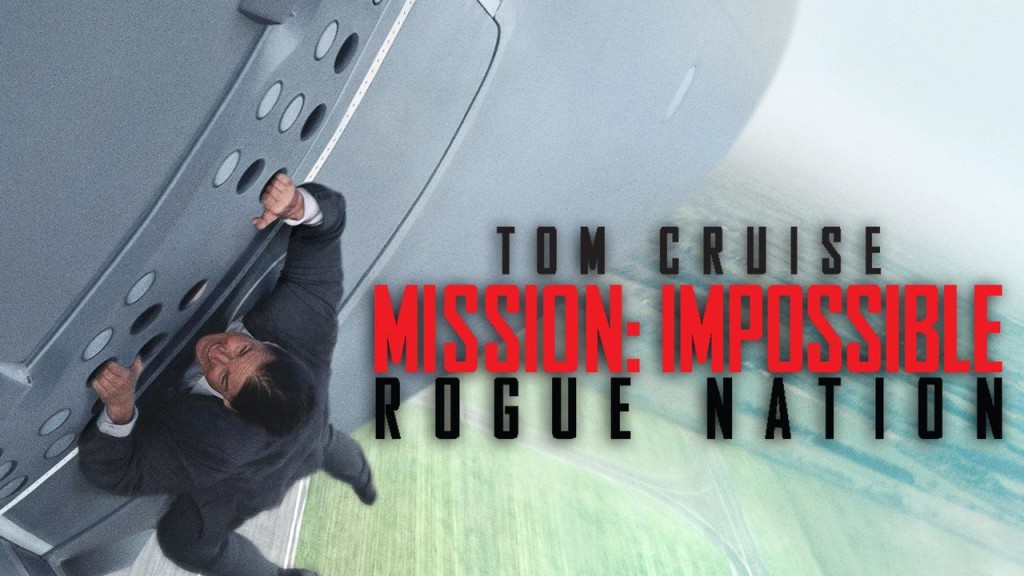 The Mission: Impossible film series continues its string of completely unrelated, endlessly entertaining standalones with Rogue Nation. In an endless sea of crossovers, resurrected old franchises with innumerable new movies on the way, and interconnected universes that only the most diehard fan could really understand (or, really, care about), there’s at least one entertaining action romp that requires zero knowledge going in, and producing zero knowledge going out. For the most part, Rogue Nation appeals to that notion of summer blockbusters as pure escapism – in this case, espionage related – and that the film knows that it’s disposable entertainment makes it entertaining.
The Mission: Impossible film series continues its string of completely unrelated, endlessly entertaining standalones with Rogue Nation. In an endless sea of crossovers, resurrected old franchises with innumerable new movies on the way, and interconnected universes that only the most diehard fan could really understand (or, really, care about), there’s at least one entertaining action romp that requires zero knowledge going in, and producing zero knowledge going out. For the most part, Rogue Nation appeals to that notion of summer blockbusters as pure escapism – in this case, espionage related – and that the film knows that it’s disposable entertainment makes it entertaining.
I guess we could say a similar thing about Ghost Protocol, the immediate predecessor to Rogue Nation, but I happen to like this film more for a few reasons. One, Rogue Nation abandons the science-fiction vibe that the series garnered in the last entry. While I appreciate the excellently coordinated action sequences, the overuse of gadgets and constant setpieces struck me as a little over-the-top at times. Yes, I know this series doesn’t have a penchant for subtlety, at least not anymore, but the original Brian De Palma film really took the concept of espionage seriously. That film didn’t make Ethan Hunt into a crazy superhero, but made him slightly bad at everything, a daredevil jack-of-all-trades navigating a world of double crosses and doublespeak; it took me about two or three viewings to really understand what was happening, but that’s a testament to the film’s excellent pacing and plot reveals. It also didn’t require much in the way of bizarre gadgetry and tons of unrealistic stunts (yes, I know Tom Cruise does them all, but nobody in real-life would bother doing something that stupid), just a solid story.
Rogue Nation smashes both the first and the fourth film together, really – it dispenses with some of the sillier aspects of Ghost Protocol, and tries once again to play up the whole concept of “people with hidden allegiances” angle to its utmost zenith. They’re shutting IMF down, and Tom Cruise must once again play Tom Cruise, find the Syndicate (a super boring name, now that I think about it), and put a stop to their plan, assuming they even exist. A mysterious woman helps Hunt out, and we don’t know why. Much in the way of elaborately designed action sequences ensue. A few off the top of my head: a tense game of cat-and-mouse in an opera house playing Turandot, Puccini’s last and unfinished work (which is actually thematically relevant for people like me who clearly know too much about opera); a heist inside of a giant water turbine that looks incredibly insane, and gives a silly reason for not letting anyone use oxygen tanks; and, of course, cars chasing cars chasing motorcycles.
All of that sounds really rote, but it’s not! Characters talk, we learn their motivations, we actually know what happens, and thus the actions sequences contain actual stakes. We actually care about the woman double agent too, who seems an excellent bit of casting, as she seems to match Cruise in nearly every way (apparently Rebecca Ferguson is a newcomer – I was trying to figure out who she was).Well, not to the point that I think Tom Cruise will suddenly die or anything, but enough that, at least, there’s a tension to the action happening onscreen that wouldn’t otherwise exist. It also helps that, wow, do these sequences contain incredible pacing, with just the right moments of absent musical cues, sound effects, and clearly understood action that makes perfect sense. It also helps that the movie continues the dry wit of the series to keep things light and airy.
Yes, Rogue Nation loves regurgitating the “shutting down a government spy organization as it tries to take down another hidden spy organization” trope, but how many other movies have that exact plot point? Also, you won’t be much surprised by the ending, though you will be surprised at its sense of poetic justice (also, it’s hilarious). Mission Impossible isn’t winning awards for most realistic series, I’ll say that much, but why should it? Alec Baldwin even appears, in probably the most fun he’s had in a big screen film since forever. Even so, they keep this one much more grounded, and much more into the vein of James Bond films (seriously, opera stuff is James Bond’s territory).
I guess the highest praise I can give this film, from a 007 fan, is that Mission Impossible: Rogue Nation blow SPECTRE out of the water in just about every single way, from plot and tone consistency to action setpieces. Why is this happening? Why am I living in an alternate reality where I like Rogue Nation more than the latest James Bond film? I don’t know, but I’m not complaining.
